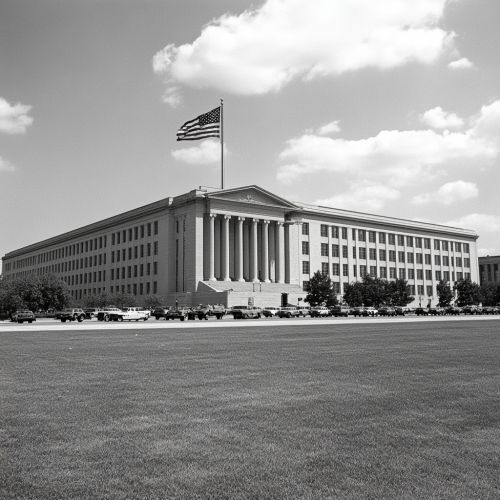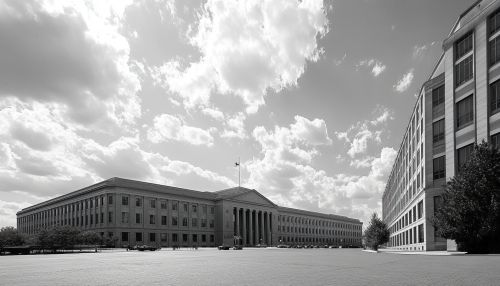Joint Chiefs of Staff
Overview
The Joint Chiefs of Staff (JCS) is a body of senior uniformed leaders in the United States Department of Defense who advise the President of the United States, the Secretary of Defense, the Homeland Security Council, and the National Security Council on military matters. The JCS is composed of the Chairman, the Vice Chairman, and the Service Chiefs from the Army, Navy, Air Force, Marine Corps, Space Force, and the Chief of the National Guard Bureau. This article delves into the structure, history, roles, and functions of the Joint Chiefs of Staff, providing a comprehensive understanding of its significance in the U.S. military framework.


Historical Background
The concept of a unified military advisory body in the United States dates back to World War II. The Joint Chiefs of Staff was formally established in 1942 to ensure coordinated military strategy among the different branches of the U.S. Armed Forces. Before this, military coordination was often fragmented, leading to inefficiencies and strategic misalignments. The National Security Act of 1947 further solidified the JCS's role, integrating it into the newly formed Department of Defense.
During the Cold War, the JCS played a crucial role in strategic planning and nuclear deterrence. The Goldwater-Nichols Department of Defense Reorganization Act of 1986 significantly restructured the JCS, enhancing the Chairman's role as the principal military advisor to the President and the Secretary of Defense, and streamlining the chain of command.
Structure and Composition
The Joint Chiefs of Staff is composed of the following members:
- **Chairman of the Joint Chiefs of Staff**: The highest-ranking and most senior military officer in the United States Armed Forces. The Chairman is the principal military advisor to the President, the Secretary of Defense, and the National Security Council.
- **Vice Chairman of the Joint Chiefs of Staff**: The second-highest-ranking military officer, who assists the Chairman and may act in their stead.
- **Service Chiefs**: The Chief of Staff of the Army, the Chief of Naval Operations, the Chief of Staff of the Air Force, the Commandant of the Marine Corps, the Chief of Space Operations, and the Chief of the National Guard Bureau.
Each Service Chief is responsible for the readiness, training, and equipping of their respective services. However, they do not exercise operational command over U.S. military forces; this authority is vested in the combatant commanders.
Roles and Responsibilities
The Joint Chiefs of Staff have several critical responsibilities:
- **Advisory Role**: The JCS provides strategic military advice to the President and the Secretary of Defense. This includes assessments of military capabilities, strategic planning, and recommendations on the use of military force.
- **Strategic Planning**: The JCS is involved in the development of national military strategies, contingency plans, and the allocation of resources to meet strategic objectives.
- **Coordination and Integration**: The JCS ensures inter-service cooperation and integration, facilitating joint operations and the efficient use of military resources.
- **Policy Development**: The JCS contributes to the formulation of defense policies and the development of military doctrine.
Decision-Making and Influence
While the Joint Chiefs of Staff hold significant influence in military matters, their role is primarily advisory. The JCS does not have command authority over combatant forces; this power is reserved for the combatant commanders under the Unified Command Plan. The JCS's influence is derived from their collective expertise and the trust placed in them by civilian leadership.
The Chairman of the Joint Chiefs of Staff, as the principal military advisor, plays a pivotal role in shaping military policy and strategy. The Chairman communicates the consensus of the JCS to the President and the Secretary of Defense, ensuring that military perspectives are considered in national security decisions.
Interagency and International Cooperation
The Joint Chiefs of Staff engage in interagency collaboration to address complex security challenges that require a whole-of-government approach. This includes working with the Department of State, the Department of Homeland Security, and other federal agencies.
Internationally, the JCS fosters military-to-military relationships with allied and partner nations. This cooperation enhances interoperability, builds trust, and strengthens collective security arrangements. The JCS participates in multinational exercises, strategic dialogues, and defense consultations to advance U.S. interests and promote global stability.
Challenges and Criticisms
The Joint Chiefs of Staff face several challenges in fulfilling their duties:
- **Complex Security Environment**: The JCS must navigate a rapidly changing security landscape characterized by emerging threats such as cyber warfare, terrorism, and great power competition.
- **Resource Constraints**: Balancing strategic priorities with limited resources requires careful planning and prioritization.
- **Bureaucratic Hurdles**: The JCS operates within a complex bureaucratic structure, which can impede decision-making and agility.
Critics of the JCS have pointed to instances of inter-service rivalry and bureaucratic inertia. However, reforms such as the Goldwater-Nichols Act have sought to address these issues by promoting jointness and enhancing the Chairman's authority.
Future Directions
The Joint Chiefs of Staff continue to evolve to meet the demands of the 21st-century security environment. This includes adapting to technological advancements, enhancing joint operational capabilities, and fostering innovation within the military. The JCS is also focused on developing strategies to counter non-traditional threats, such as information warfare and climate change.
The integration of the U.S. Space Force into the JCS reflects the growing importance of space as a domain of warfare. The JCS is also prioritizing efforts to strengthen alliances and partnerships, recognizing the value of collective security in addressing global challenges.
